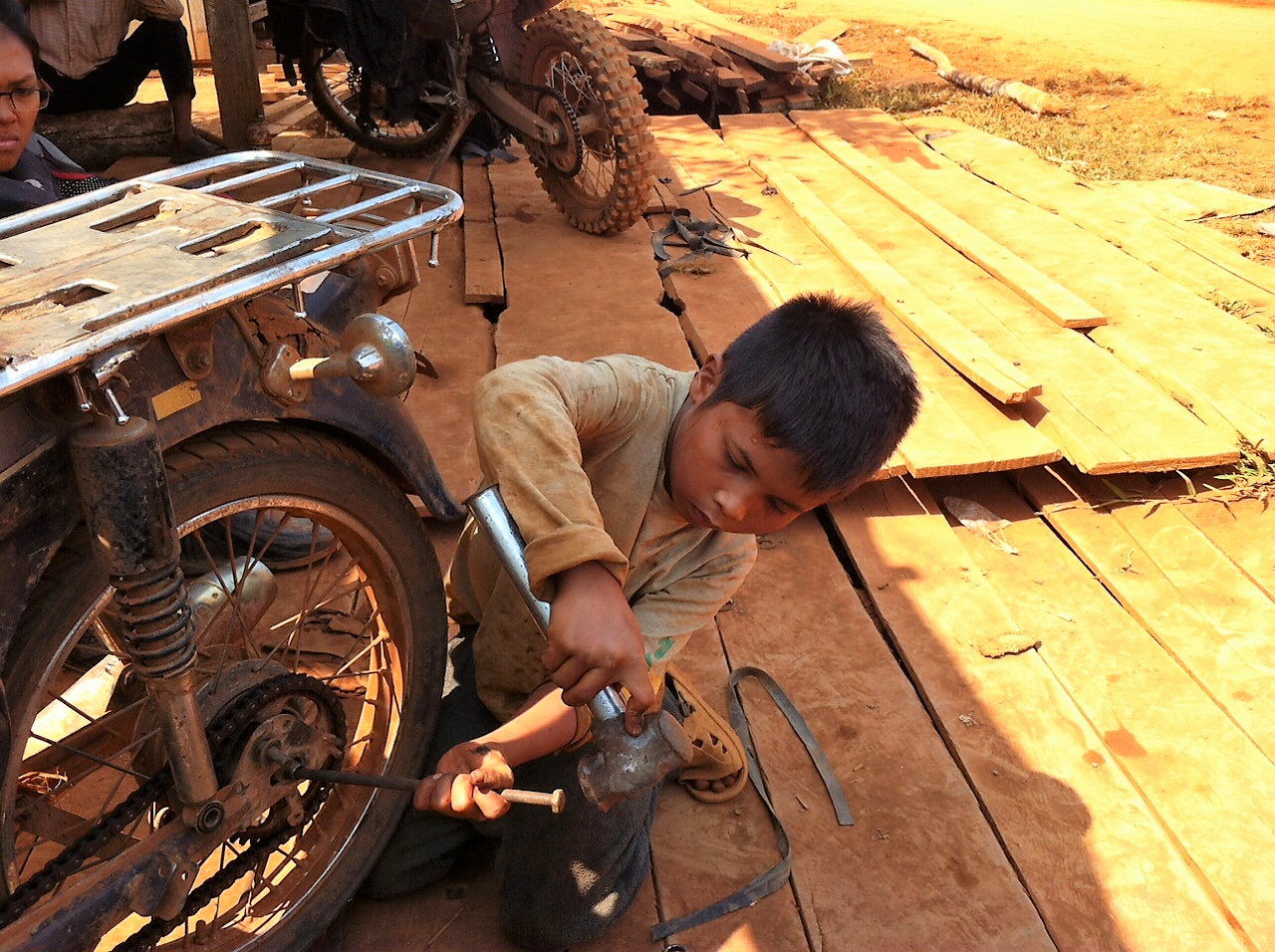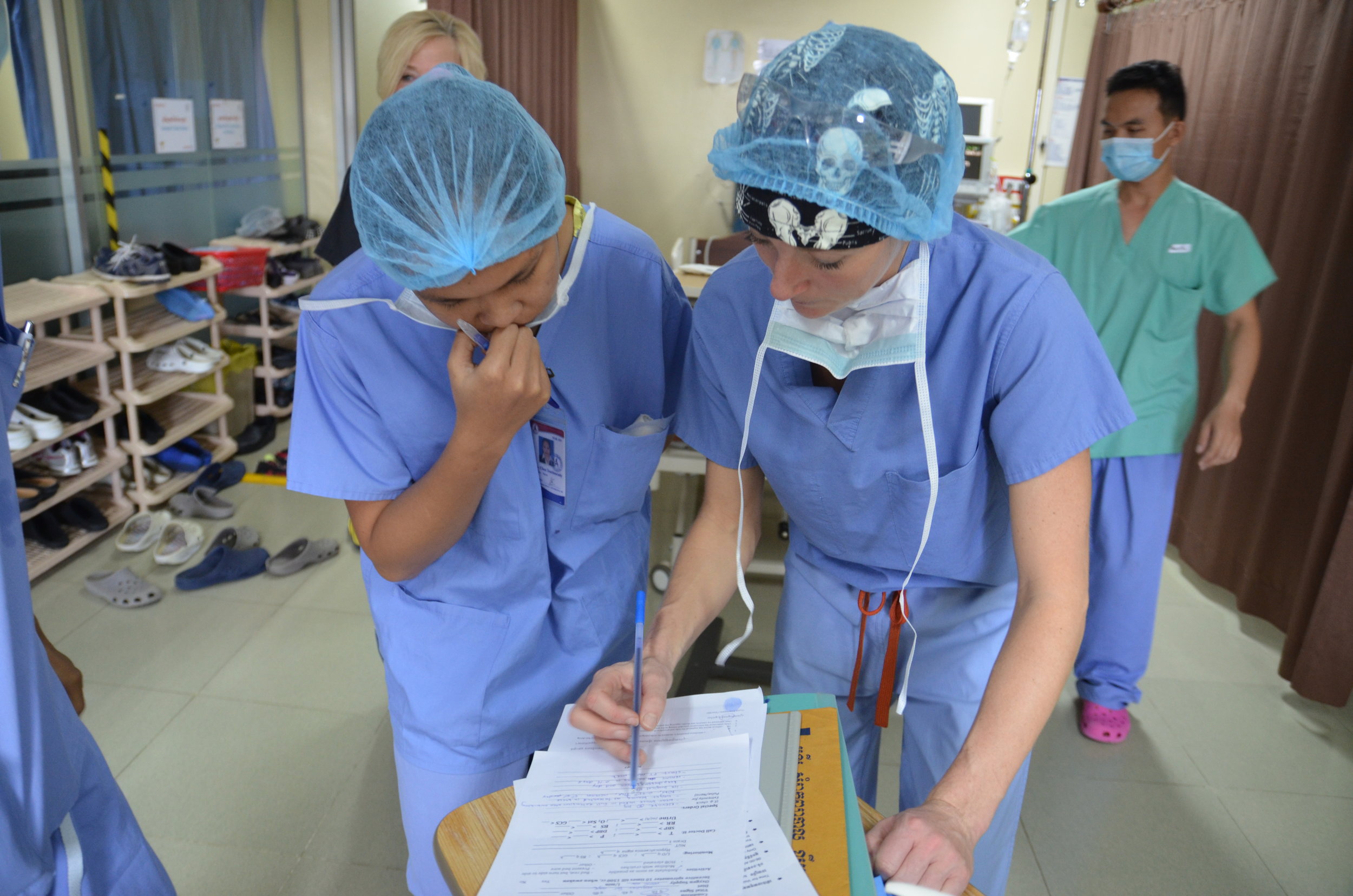Stories
This young man had a congenital deformity known as pre-axial polydactyly, a condition in which he was born with two thumbs on each hand. It is actually not as uncommon as one would think. Here in the U.S. it is usually taken care of very early, even by the time the newborn goes home. This young man is ten years old and has learned to live with this condition. In Cambodia, it does “take a village” to survive as most people are farmers and they survive together as a community. The young man and his family were slowly pushed aside by the community because they believed that the young man was cursed due to his extra thumbs. Being ostracized in Cambodia is a very serious issue. Without the communities support this young man and his family were in a very tight spot.
Dr. Ocel performed the operation to remove his extra thumbs. The surgery turned into quite the event. During surgery dozens of people gathered waiting to see the boy post-op. After the surgery the boy's family and the people who had gathered were overjoyed to see the boy with only ten fingers. The boy has gone on to become a well-known bike mechanic and a local celebrity for his physical transformation. The family is no longer on the “outside”, and is vital component of the interdependent community.
This young boy is a good example for a typical orthopedic case that we run into on our missions in Cambodia. Many skeletal issues if untreated lead to chronic problems later in life. This boy had a femoral osteotomy performed. This is a surgery in which the physician cuts the femur and realigns it. The operation is extremely vital especially for young children like this boy. Without the operation there are many likely resulting handicaps such as hip impingement, articular cartilage damage, labrum tears, and hip joint damage. In Cambodia these are all extremely life threatening issues as much of their livelihoods depend on farming, a labor-intensive occupation.
On the July 2012 trip to Phnom Penh, Cambodia, the orthopedic team sent by the Cornerstone Foundation met Kheav, a 50-year-old poor farmer with a shoulder injury that rendered his arm useless. In May 2012, Kheav was plowing his field when his water-buffalo kicked him in the shoulder. Kheav experienced immediate pain and found that he was unable to move his arm. Realizing that without the use of his arm he wouldn't be able to farm nor feed his family, Kheav sought a local physician for help. Since there are not any X-ray machines in Kompot, the country providence Kheav is from, the physician was unable to diagnose him and told him he did not know what was wrong with his shoulder. Kheav returned to his farm where he struggled to plow the land and maintain the fields alone with only one functioning arm. After struggling for awhile, Kheav realized he couldn't farm anymore, so though already stricken with poverty, he was forced to hire people to farm for him. Kheav's situation seemed hopeless; he had one functioning arm, one completely useless arm, he was poor and forced to use what little money he had to pay others to work for him. He still did not have a diagnosis and there was no solution in sight.
Two months later, in July 2012, a missionary in Kompot told Kheav that an orthopedic team had come to Jeremiah's Hope clinic in Phnom Penh and advised Kheav to travel to the capitol to see if they could help him. After an expensive three hour drive, Kheav arrived at Jeremiah's Hope* on July 23, 2012 where he met Dr. Joseph Hsin. After a quick X-ray Kheav finally discovered the cause behind his pain and his inability to use his arm; Kheav's shoulder had been dislocated for more than two months. His humeral head was sitting inches below where it should and it was fractured. Dr. Hsin gave Kheav the news that he had been hoping to hear ever since his injury; his shoulder could be fixed. Just two days later, Kheav was taken to the operating room at Jeremiah's Hope where his shoulder was surgically repaired and put back in place. Although Kheav's story is unique to him, people all throughout Cambodia find themselves in similar situations: different injuries and various medical conditions without money to pay for health care or the ability to find physicians who are available and capable to treat them.
The amazing thing about Kheav is, although his shoulder was dislocated for two months, he never complained of pain or the unfairness of the situation. Instead, he only voiced his desire to have his shoulder repaired so that he could work and support his family. It is a selfless attitude that seems to be universal amongst the Cambodians. In spite of a government that has let them down and in spite of not having access to health care, the Cambodian people demonstrate a calm acceptance of the way life has turned out. They are friendly, always willing to help, and do not complain. Kheav, along with the rest of the Cambodian patients, simply appreciate that a doctor from America cares enough to help them.
*Jeremiah's Hope is the clinic that the Cornerstone Foundation partners with in Cambodia. All surgeries are performed at this clinic and this is where most of the donated medical equipment is sent.
Post operation
Cambodian staff and one of our team members displaying Exceptional teamwork!
This man had been hit by a scooter and suffered a tibial plateau fracture (knee fracture). Pedestrian accidents as well as driver accidents are quite high in the city as there are very few pedestrian and driver regulations or rules. The lack of safety leads to many different types of injuries as well as fatalities. We first met this patient when we went to visit him in the inpatient unit to set him up with a knee brace. Upon seeing him initially, it was evident that he had lacerations and bruising about this face. He was in a considerable amount of pain. Alongside him was his family, concerned and unsure of what was going on. Luckily, a Cambodian nurse was able to bridge the communication barrier and communicate to the patient that we planned on surgically repairing his fractured knee. He was so thankful to have medical care.
The following day the team was able to repair his fracture, ultimately enabling him to return to his occupation, family responsibilities, and future desires. Furthermore, we were able to serve people in a way that they were able to “pass on” and continue to improve Cambodia with their own unique talents and abilities. Another aspect that was amazing was the level of teamwork that our team from Colorado and the Cambodian staff was able to accomplish. While we were in the clinic one patient exclaimed, “Come back sooner next time!” We will.









